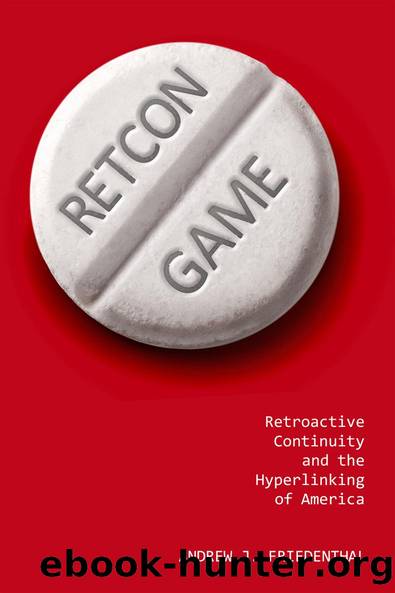Retcon Game by Andrew J. Friedenthal

Author:Andrew J. Friedenthal [Friedenthal, Andrew J.]
Language: eng
Format: epub
Tags: Social Science, Media Studies, Popular Culture, Literary Criticism, Comics & Graphic Novels, Performing Arts, Television, History & Criticism, Film
ISBN: 9781496811356
Google: QRmSDgAAQBAJ
Publisher: Univ. Press of Mississippi
Published: 2017-04-03T05:49:13+00:00
Throughout the history of the World there were freedom fighters, and this is their history, whether uniformed or not, whether powered or ordinary ⦠I have been able to place them chronologically and thus show a continuity of eventsâ¦. What began many years in the past will be remembered and acted upon many centuries from now. What was affects what is and what will be. This, more than any other reason, is why this history of the universe is needed. To look at the heroic age without perspective, to understand one element without seeing the whole, is to do it a vast injustice. (Wolfman 2002, 54)
In this speech, Wolfman seems to be speaking, through Harbinger, about the nature of continuity itself (note the use of the phrase âcontinuity of eventsâ). The purpose of History is to give an understanding of DCâs continuity to readers, creators, and editors alike, so that they can âsee the wholeâ instead of just âone element,â and thus avoid recreating the confusing morass of contradictions that led to the need for Crisis in the first place.
In order to make such a text palatable, though, the chronicle (in Whiteâs usage of the term) of events that made up DC continuity had to be turned into an entertaining story, a narrative. Wolfman, via Harbinger, states this directly: âThis is not a chronological retelling of historical events which can be read in any textâthis is the history of heroismâ (Wolfman 2002, 55). This statement serves several purposes. On a surface level, it provides Wolfman with a narrative excuse for Harbinger to relate only the events that separate the DC Universe from the real world, rather than providing a full textbook of world history. It also, however, structures the entire fictional universe around the concept of âheroism,â making it clear that the DC Universe revolves around heroes and heroines as the pivot-points of its history. It places the characters, rather than specific events, at the center of the universe, something that was crucial to a text that was erasing many of those events from its own history in order to focus on presenting streamlined characters and stories to discerning, mature fans.
Both Crisis and History were direct attempts by DC to expand their market share in a culturally marginalized industry. Since the rise of Marvelâs popularity in the 1960s, DC had been seen both by both fans and cultural critics as a secondary company. The publisherâs focus on mythic god-like heroes, multiple universes, and clear-cut tropes of good versus evil had made it lag behind Marvel in terms of both sales and critical success. Because Marvelâs heroes were created to be better-rounded characters with more relatable problems, the older audience that made up the readership of the 1980s gravitated much more strongly to their line than to DCâs. The post-Crisis DC Universe, the one solidified by History, was a direct response to this, providing a mission statement for the publisher to focus on more mature stories with richer characters.
In order to
Download
This site does not store any files on its server. We only index and link to content provided by other sites. Please contact the content providers to delete copyright contents if any and email us, we'll remove relevant links or contents immediately.
4 3 2 1: A Novel by Paul Auster(12360)
The handmaid's tale by Margaret Atwood(7744)
Giovanni's Room by James Baldwin(7313)
Asking the Right Questions: A Guide to Critical Thinking by M. Neil Browne & Stuart M. Keeley(5747)
Big Magic: Creative Living Beyond Fear by Elizabeth Gilbert(5735)
Ego Is the Enemy by Ryan Holiday(5404)
The Body: A Guide for Occupants by Bill Bryson(5067)
On Writing A Memoir of the Craft by Stephen King(4924)
Ken Follett - World without end by Ken Follett(4712)
Adulting by Kelly Williams Brown(4558)
Bluets by Maggie Nelson(4541)
Eat That Frog! by Brian Tracy(4508)
Guilty Pleasures by Laurell K Hamilton(4432)
The Poetry of Pablo Neruda by Pablo Neruda(4084)
Alive: The Story of the Andes Survivors by Piers Paul Read(4013)
White Noise - A Novel by Don DeLillo(3998)
Fingerprints of the Gods by Graham Hancock(3982)
The Book of Joy by Dalai Lama(3965)
The Bookshop by Penelope Fitzgerald(3838)
